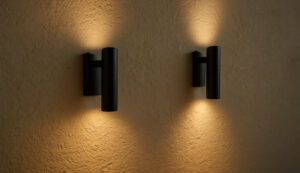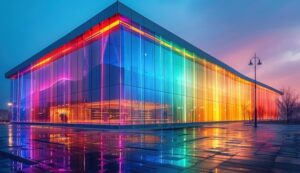In this article, we delve into ETL listing, its benefit to modern lighting design, and its importance in meeting safety regulations and compliances.
What is ETL Listed Lighting?
ETL is a lighting safety testing and certification standard monitored by Intertek, an international quality assurance provider. The ETL safety certification process involves various tests assessing light fixtures’ quality and reliability. Testing parameters include brightness output, power consumption, electrical safety, color rendition (CRI), and other relevant parameters.
The exact testing procedures vary based on the lighting products. LED lights are held to a higher energy efficiency standard than traditional incandescent or halogen lamps. So, the testing procedures will be fine-tuned to the luminaire design. Consumers can check the comprehensive ETL listing at the Intertek website, which shows all certified products bearing the ETL mark.
ETL-listed lighting products comply with various national and international safety standards, such as the National Fire Protection Association (NFPA). However, the ETL marking is primarily relegated to the North American market.
You can learn more about the ELT certification process and Intertek Testing Laboratories here.
Origins of ETL
The origins of ETL date back to 1896, when a young Thomas Edison established the Lamp Testing Bureau. By 1904, the lab was renamed Electrical Testing Laboratories and served as an independent lighting testing facility. Eventually, the lab became part of Intertek, and its name was shortened to just “ETL.”
What is UL Certification?
UL Enterprises (formerly Underwriters Laboratories) is another well-known name in equipment safety testing based out of the US. The massive company is made up of three organizations.
- UL Research Industries – Responsible for researching new testing techniques and technologies
- UL Standards & Engagement – Responsible for designing safety standards for various electronic components and devices.
- UL Solutions – Responsible for testing products and issuing certifications.
UL certification division is a result of years of research and development investment by its partner company. While ETL listed and UL certification share some similarities, key differences set the two apart.
ETL Certification vs UL Certification
Electrical safety has always been a major concern for governments, private businesses, and the general public. So, it should come as no surprise that several companies across the globe provide safety testing and certification of electrical components and devices.
ETL-listed and UL-listed are two of the most popular lighting certifications in the North American market. Here are some key differences between the two organizations and their certification standards.
1. OSHA Recognition
The Occupational Safety and Health Administration (OSHA) is a regulatory body of the United States Department of Labor. It sets standards and guidelines for businesses to ensure worker safety.
OSHA lists Nationally Recognized Testing Laboratories (NRTLs) that recognize Intertek and UL Enterprises as reputable testing and certification bodies.
2. Testing Standards
The main difference between these two certification companies is their approach to safety standards. UL is a much larger company than ETL and develops its own testing standards. In contrast, Intertek uses established standards, including UL ones.
3. Applications & Industries
ETL tests products related to lighting fixtures. Meanwhile, UL covers a much broader category of electrical devices. UL Solutions provides certifications in over 200 product categories, including 19 light design certifications.
It should be noted that ETL’s parent company, Intertek, also provides a diverse range of certification services. However, the ETL-listed mark is only limited to lighting fixtures.
4. Certification Period
Due to the more streamlined process, getting an ETL certification usually takes less time. By comparison, UL certification is a more time-consuming process. Part of the delay can be attributed to the more complicated operations at UL Solutions.
5. Brand Recognition
ETL-listed and UL-certified markings hold equal value in the United States. However, the global market is a different story. UL-recognized products are well-known by international consumers and help build brand trust.
ETL-listed products are tested to high standards like UL and are becoming popular worldwide. They may even catch up to UL certifications in the next few years.
Comparing ETL and UL Listed Lighting Products
| Attributes | ETL Lighting | UL Lighting |
|---|---|---|
| OSHA Recognition | Yes | Yes |
| Testing Standards | Using Existing Standards | Creates its Own Standards |
| Applications & Industries | Only Applicable to Lighting Products | Applicable to All types of Electrical Devices |
| Certification Period | Short | Long |
| Brand Recognition | Limited Outside of NA | Well Recognized Worldwide |
6 Benefits of ETL-Listed Lighting Products
ETL-certified products assure consumers of quality, reliability, performance, and safety. The certification helps businesses establish trust with customers and enables expansion in the global market.
Here is a list of the top benefits of ETL-listed lighting products.
1. Ensuring Public Safety
By far, the biggest benefit of ETL-listed (and UL-listed) products is their guaranteed safety. When consumers buy a light fixture with an ETL marking on the side, they know that it has been thoroughly tested and will not shock, malfunction, or start a fire.
Businesses upgrading their lighting design will also benefit from using ETL-certified products. Their workspace will be safer for employees and guests, and safety inspections will process smoothly.
2. Lighting Quality Assurance
Lighting products sold in the United States cover a wide field. From modern controlled LED lights to old-school warm halogens, every light fixture has to pass a safety check.
An ETL or UL-certified fixture assures customers that the product will perform as advertised and run for a long time without a hitch.
3. Energy Efficiency Certification
An often overlooked benefit of ETL-listed products is their compliance with energy efficiency standards. A single energy-efficient light bulb will not make much of a difference in your electricity bill. Businesses and commercial buildings save money over time by using fewer light fixtures and reducing energy consumption.
4. Meeting Legal Compliance
Countries across the globe require businesses to meet certain safety regulations and energy efficiency criteria. You have covered most of the lighting requirements by using ETL or similar certified lighting products.
Learn more about lighting requirements and legal compliances here.
5. Establishing Brand Credibility
Brand recognition and credibility are the keys to long-term success in any industry. Using top-notch light fixtures approved by a well-known testing lab can make your business stand out from competitors.
The hospitality industry, in particular, runs on brand credibility and consumer trust. ETL-listed and UL-certified products show guests they are in a safe and welcoming place.
6. International Recognition
Businesses looking to expand internationally will first need to establish credibility and trust. An ETL or UL certification can go a long way toward establishing a brand.
Buyers will always be hesitant when buying from an unknown new brand. However, suppose they know these products comply with the same safety standards they recognize. In that case, brand adoption will be a lot easier.
Other Certification Standards
Before we wrap up this article, let’s discuss other agencies and regulatory bodies that provide lighting safety certifications.
Canadian Standards Association (CSA)
The US’s neighbor from the cold north has its own lighting certification standard, CSA International. Canada’s regulations overlap greatly with those of the US, and the CSA certification primarily follows standards set by the ANSI, UL, and NSF.
ETL and UL certificates are valid throughout North America, including Canada. The CSA certification is mostly for businesses based in Canada.
Conformité Européenne (CE)
The European Union has its own safety standards, carefully designed to align with all 27 member nations. CE sets more detailed and stricter standards for all electronic standards. Despite leaving the EU, the UK still follows many of the same standards.
North American companies looking to expand to the EU should consider CE certification.
Conclusion
ELT-listed lighting refers to fixtures tested and certified by Intertek testing company. Consumers buying lighting products bearing the ETL mark can rest assured that they are getting a safe, reliable, and efficient, high-quality luminaire. An ETL or UL-recognized fixture is essentially the same for consumers, as both standards promise high-quality products. However, a UL listing holds more value for business owners and OEM lighting manufacturers as it has better international recognition.
Get Certified Lighting Products from RC Lighting!
RC Lighting is an established LED lighting manufacturer and service provider. We have a long track record of selling high-quality LED fixtures to a diverse global clientele. Our Indoor Lighting and Outdoor Lighting products comply with all national and international standards, including ISO9001, CE, RoHS, and UL/ETL.
For businesses looking for a more hands-on approach to their lighting design, RC Lighting offers OEM services. Take advantage of our expert design engineers, rapid prototyping, precision manufacturing, and packaging solutions.
Get the highest quality ETL lighting today. Contact us Now!



